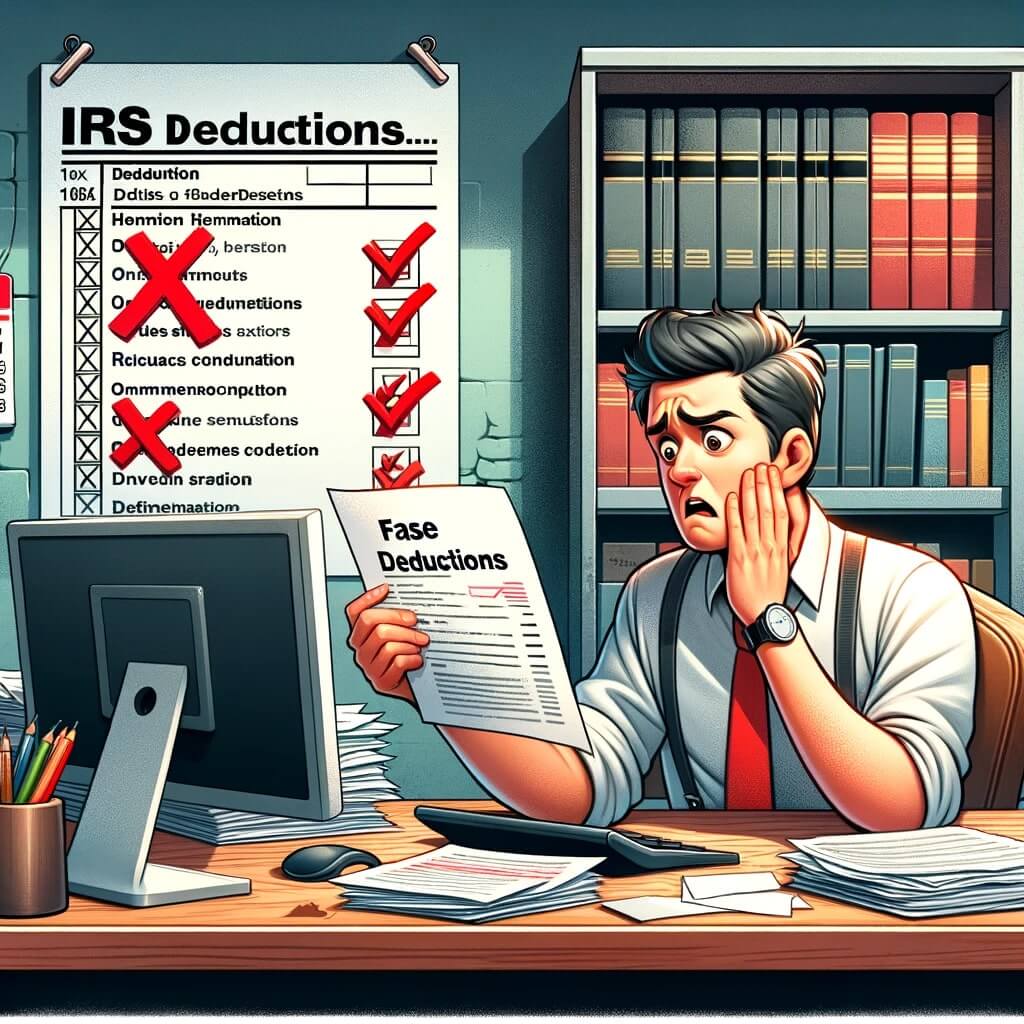
Understanding Tax Deductions
Before delving into the consequences of false deductions, it’s crucial to comprehend the significance of legitimate tax deductions. Deductions serve as a means for taxpayers to reduce their taxable income, ultimately lowering the amount of income subject to taxation. Legitimate deductions include expenses related to education, medical bills, charitable contributions, and mortgage interest.
What are IRS False Deductions?
IRS false deductions refer to the deliberate or unintentional act of inflating or fabricating deductions on your tax return. These deductions may include expenses that do not qualify for deductions under tax laws or exaggerating the value of legitimate deductions. Common examples include inflating charitable contributions, fabricating business expenses, or claiming unauthorized deductions.
The Penalties for False Deductions
Claiming false deductions on your tax return can result in a series of penalties and consequences, including:
Financial Penalties
The IRS can impose severe financial penalties, which often exceed the tax benefits you sought to gain through false deductions.
Interest Charges
In addition to penalties, the IRS can charge interest on the unpaid taxes resulting from false deductions.
Audit and Legal Action
Claiming false deductions can increase your chances of being audited by the IRS. If irregularities are detected, it may lead to further legal actions and potential criminal charges.
Loss of Credibility
Engaging in tax fraud, including claiming false deductions, can tarnish your financial reputation and credibility with tax authorities.
Assessing the Financial Impact
The financial impact of false deductions varies based on several factors:
- Extent of Falsification: The severity of the false deductions and the degree of exaggeration play a significant role in determining the financial consequences.
- Tax Bracket: Your current tax bracket and the amount of taxable income subject to false deductions influence the overall financial obligation.
- Penalty Rates: IRS penalties for false deductions can range from 20% to 75% of the underpaid tax, depending on the circumstances.
- Interest Charges: Accrued interest on the unpaid tax amount will also contribute to your financial obligation.
Conclusion
The consequences of IRS false deductions can be severe, leading to substantial financial penalties, interest charges, audits, and even legal action. Engaging in tax fraud by claiming false deductions can have far-reaching consequences for your financial well-being and credibility.
To navigate this challenging terrain, it’s crucial to seek professional assistance. Priority Tax Relief stands ready to provide the expertise and support needed to address tax-related issues effectively and responsibly. Remember, honesty and accuracy in tax matters are not only legally required but also the best path toward financial stability and peace of mind.
Frequently Asked Questions:
Can a deduction be wrong?
Yes, a deduction can be incorrect if it does not comply with IRS rules or is mistakenly claimed for ineligible expenses.
Does the IRS ask for proof of deductions?
Yes, the IRS can request documentation to substantiate deductions claimed on your tax return.
How do I report a false claim to the IRS?
Report false claims to the IRS by filling out Form 3949-A or sending a detailed letter to the IRS office.
What happens if the IRS makes a mistake?
If the IRS makes an error, you can contact them to clarify and correct the mistake, often through documentation or an appeal.
What is considered a false deduction?
A false deduction is a claim for an expense that is not actually incurred, not legally deductible, or exaggerated.
What is the penalty for wrong deduction?
Penalties for incorrect deductions can include fines, interest on unpaid taxes, and in severe cases, criminal charges.
How do I find out why my tax refund was reduced?
Report false claims to the IRS by filling out Form 3949-A or sending a detailed letter to the IRS office.
What if your deductions are more than you made?
If deductions exceed income, it may result in a net operating loss, which can sometimes be carried to other tax years.
Does the IRS check your deductions?
Yes, the IRS may review and audit tax returns to verify the accuracy of deductions.
What happens if you can't prove deductions?
If you can’t provide proof for deductions, the IRS may disallow them, resulting in additional taxes owed and possible penalties.
How much deductions can I claim without proof?
Technically, you are required to have proof for all deductions you claim. However, small, reasonable amounts, especially under standard deductions, might not be scrutinized.







